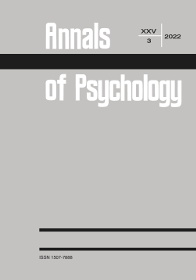CONCEPT OF PSYCHOPATHIC POSITIVE-ADJUSTMENT TRAITS:
A BRIEF REVIEW OF THEORY AND RESEARCH
CONCEPT OF PSYCHOPATHIC POSITIVE-ADJUSTMENT TRAITS:
A BRIEF REVIEW OF THEORY AND RESEARCH
Author(s): Krzysztof NowakowskiSubject(s): Personality Psychology, Clinical psychology, Health and medicine and law
Published by: Towarzystwo Naukowe KUL & Katolicki Uniwersytet Lubelski Jana Pawła II
Keywords: psychopathy; non-criminal psychopathy; personality disorders; boldness;
Summary/Abstract: Although psychopathy is commonly regarded as a disorder closely related to criminality, there is also increasing attention paid to its non-criminal form and the adaptive features of psychopathic personality. The aim of this article is to introduce the concept of psychopathic traits of good adaptation, both in light of the theoretical foundations of the construct and the empirical data. The article demonstrates the presence of such traits in classical and contemporary models of psychopathy, in the evolutionary approach, and in relation to the division into primary and secondary psychopathy. Furthermore, it reviews the studies on the prevalence of adaptive features of psychopathy in different profession- al groups. The attempt to operationalize the construct of psychopathic traits of good adaptation— the Durand Adaptive Psychopathic Traits Questionnaire (Durand, 2019)—is also discussed. Finally, the limitations of using the concept of adaptive traits of psychopathy are analysed.
Journal: Roczniki Psychologiczne
- Issue Year: 25/2022
- Issue No: 3
- Page Range: 193-207
- Page Count: 16
- Language: English

